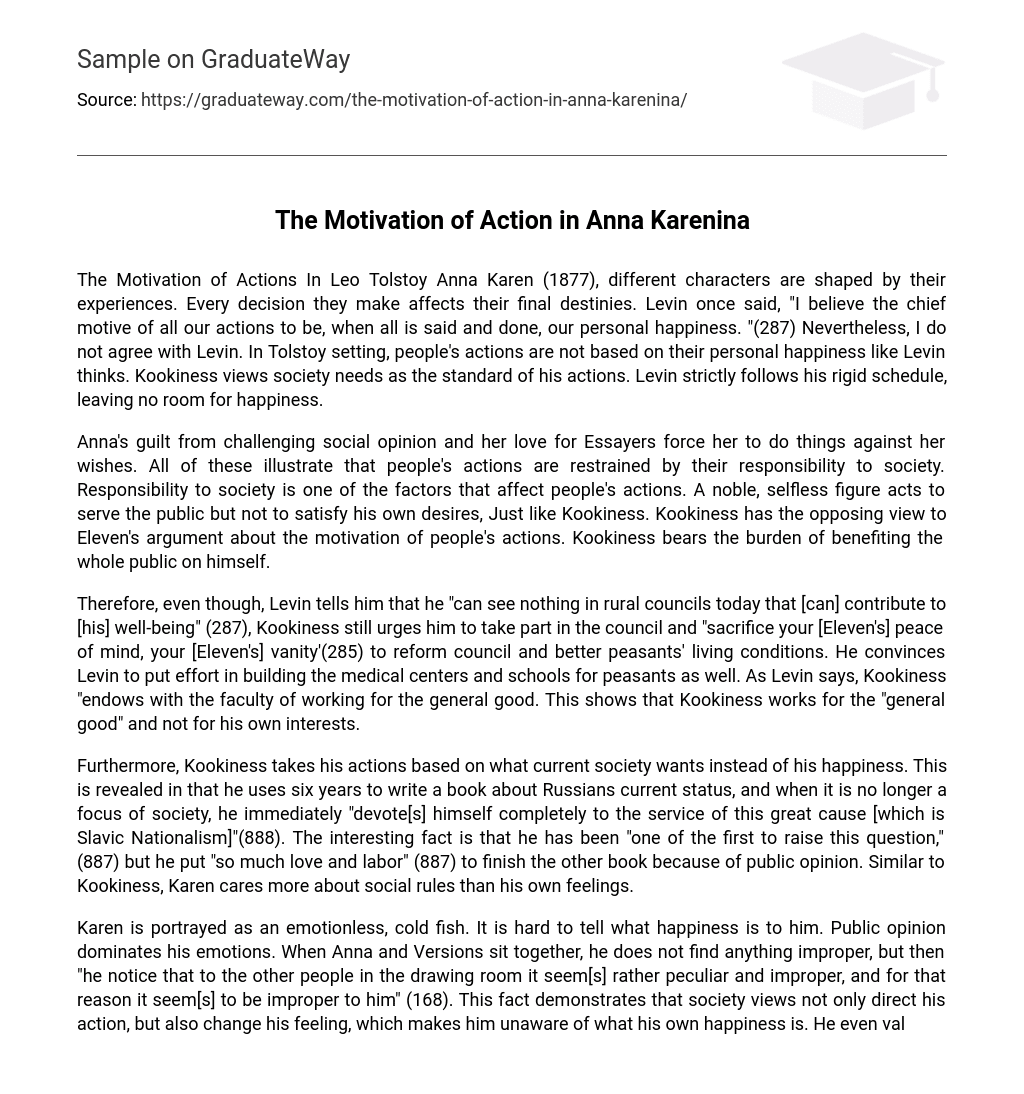The Motivation of Actions In Leo Tolstoy Anna Karen (1877), different characters are shaped by their experiences. Every decision they make affects their final destinies. Levin once said, “I believe the chief motive of all our actions to be, when all is said and done, our personal happiness. “(287) Nevertheless, I do not agree with Levin. In Tolstoy setting, people’s actions are not based on their personal happiness like Levin thinks. Kookiness views society needs as the standard of his actions. Levin strictly follows his rigid schedule, leaving no room for happiness.
Anna’s guilt from challenging social opinion and her love for Essayers force her to do things against her wishes. All of these illustrate that people’s actions are restrained by their responsibility to society. Responsibility to society is one of the factors that affect people’s actions. A noble, selfless figure acts to serve the public but not to satisfy his own desires, Just like Kookiness. Kookiness has the opposing view to Eleven’s argument about the motivation of people’s actions. Kookiness bears the burden of benefiting the whole public on himself.
Therefore, even though, Levin tells him that he “can see nothing in rural councils today that [can] contribute to [his] well-being” (287), Kookiness still urges him to take part in the council and “sacrifice your [Eleven’s] peace of mind, your [Eleven’s] vanity'(285) to reform council and better peasants’ living conditions. He convinces Levin to put effort in building the medical centers and schools for peasants as well. As Levin says, Kookiness “endows with the faculty of working for the general good. This shows that Kookiness works for the “general good” and not for his own interests.
Furthermore, Kookiness takes his actions based on what current society wants instead of his happiness. This is revealed in that he uses six years to write a book about Russians current status, and when it is no longer a focus of society, he immediately “devote[s] himself completely to the service of this great cause [which is Slavic Nationalism]”(888). The interesting fact is that he has been “one of the first to raise this question,” (887) but he put “so much love and labor” (887) to finish the other book because of public opinion. Similar to Kookiness, Karen cares more about social rules than his own feelings.
Karen is portrayed as an emotionless, cold fish. It is hard to tell what happiness is to him. Public opinion dominates his emotions. When Anna and Versions sit together, he does not find anything improper, but then “he notice that to the other people in the drawing room it seem[s] rather peculiar and improper, and for that reason it seem[s] to be improper to him” (168). This fact demonstrates that society views not only direct his action, but also change his feeling, which makes him unaware of what his own happiness is. He even values others’ opinions more regarding his own marriage.
Karen is slow to notice his wife Anna betrays him for Versions. Even after Karen catches it on, and agrees with Anna that she is a bad woman, he does not yell or become angry at her. He feels too much pain to have a public divorce. Karen asks Anna to still act as his wife because he has to “safeguard his honor” (373). His coldness determines that he cannot do things as what he wants. This reveals that Karen himself creates a strict schedule for his life. He arranges his work, dinner parties, reading, and philosophical discussions in a clockwork taxation.
There is no way tort him to suddenly take action tort his own interests. In addition to society rules, cultural opinion and love, instead of one’s own happiness, can also be motivations for actions. Anna, the main character in the book is described as a heroine figure who seeks true love. However, she feels guilty for betraying Karen. She calls herself “a guilty woman, a bad woman” (373). Because of this guilt, she cannot get rid of her marriage as she wants. Anna suffers for her guilt, whereas Bobolinks, who does the same thing, suffers not.
The guilt which is caused by the conflict of her behavior and what she is told drives her do things against her will. Anna’s love for Essayers makes her afraid that Karen will take Essayers away from her. Anna wants to leave with Essayers. However, after reading Keratin’s letter, she finds that she does not “have the strength to escape from her former position” (343). Knowing that “she would never know the meaning of the freedom of love” (343), and hat she “would always remain the guilty wife” (343), Anna still unwillingly decides to stay.
The chaos which is caused by the peasant revolution and the conflict between modern and traditional ideals in Russia determines that characters in Anna Karen, as aristocrats, are not able to always follow their own free wills. Living in a society, there are many things such as society rules, cultural opinions and responsibilities that stop people from doing things the way they want to. Forces in an unstable time characterize each figure but also combat them from gaining their own happiness.





